The Free Ubuntu Linux Distribution
Who We All Are
Carsten Schnober & Mathias Huber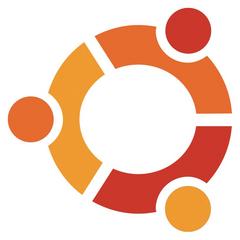
The Free Ubuntu Linux DistributionWho We All AreCarsten Schnober & Mathias Huber |

|
Debian [1] has a reputation for reliability despite the fact that it is not backed by a company but is a community effort. Economic concerns prohibit a rapid release policy; on the contrary, the latest stable version of Debian mostly lacks state-of-the-art software. Of course you can climb onto the testing branch, but you are on your own with it, and don't expect security updates. In contrast to this, companies that release commercial distributions promise regular updates and support.
Canonical [2], with its Debian derivate Ubuntu Linux [3], tries to find the golden mean. Each release of this distribution is based on a snapshot of Debian Sarge, which is still in testing. The Ubuntu team adds a modern desktop and a useful default configuration, and they give you security updates if vulnerabilities appear.
| Ubuntu - an African word |
|
The word Ubuntu comes from the South African Nguni language family and can't really be translated into any European language. As the Ubuntu site [3] tells us, "Ubuntu" is an ancient African word meaning "humanity to others." Ubuntu also means "I am what I am because of who we all are." These were the values that multi-millionaire Mark Shuttleworth had in mind when he decided to invest in Ubuntu. Mark Shuttleworth is the owner of Canonical, the company that pays for Ubuntu development. Canonical ensures users that Ubuntu Linux will always comprise free software and thus always be free of charge. Of course, Canonical still hopes to benefit from Ubuntu in the long term, although revenue will be restricted to support agreements and will not be derived from selling Ubuntu boxes. |
Canonical hopes to release a new version of Ubuntu every six months; that is, they will be keeping up with the Gnomes. Version 4.10, codenamed Warty Warthog, was released right on schedule in October 2004. (The version number reflects the year and month.) The successor, Hoary Hedgehog, is due to be released in April .
The Ubuntu installation CD includes only free software; it can be downloaded for free, installed as often as you like, and distributed as you see fit. Canonical will even save you the cost of downloading the distribution; it sends out Ubuntu CDs worldwide on request.
If you have already tried the new Debian Sarge Installer, you should find yourself in a familiar environment after booting the Ubuntu CD. Instead of a GUI-based installation tool, Ubuntu gives you a keyboard-controlled, text-based menu. This said, the install should not prove much of a challenge even to inexperienced users. Take care while partitioning; by default, the Installer suggests deleting your whole disk and installing Ubuntu instead.
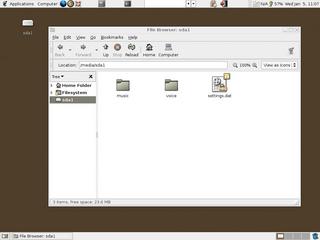
The only change the Ubuntu team has made to the Debian Installer is the selection of software. Ubuntu has left this item out completely. The installation routine simply asks you if you would like to download updates off the Internet before going on to install a pre-configured selection of packages, including the current Gnome 2.8 and additional desktop material. You can opt for a different desktop (such as KDE) if you like, but this does mean going to the Ubuntu server at a later stage to download the desktop. Ubuntu works along the lines of restricting the choice of tools for each task to a single program, and this means that Ubuntu installs a restricted selection of software by default.
If you decide not to update over the Internet, the installation should complete a lot more quickly than with most other distributions. On the downside, the Installer will not configure Internet access in this case, leaving the task for you to complete later.
After completing the install, users will find themselves in a nicely pre-configured Gnome 2.8 landscape. Ubuntu handles the root account like Apple's Mac OS X - this is something unusual for a Linux distribution, as it means that root is disabled by default. The first user created on the system is permitted to sudo any tasks typically restricted to the root user. As a compromise between convenience and security, this user is prompted to supply his or her password the first time he or she calls sudo. The password is then stored in memory for five minutes. To enable the root account, all you need to do is to set a password by typing sudo passwd root.
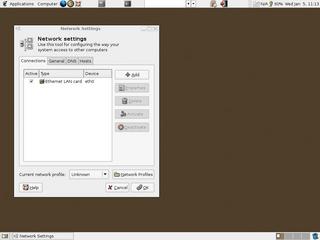
Ubuntu's kernel-based hotplugging system cooperates seamlessly with the Gnome desktop to auto-detect and support a wide range of hardware. CD ROMs, USB memory sticks, and other removable media immediately appear on the desktop when inserted (see Figure 1).
Ubuntu uses sophisticated Debian scripts to support laptop operations. On a laptop, Ubuntu will automatically display the battery status applet in the Gnome panel, showing the battery status for APM or ACPI systems.
Ubuntu not only supports PCs; our test using an iBook G4/800 went off without a hitch. Although Yellow Dog and Gentoo Linux had both failed to deliver a GUI, Ubuntu served up the login manager after the install. The control keys on our Macintosh all worked without manual adjustment, and the iBook even switched off the display when we closed the lid.
This said, some manual steps may be necessary to support computers that will not run the default kernel. For example, a USB WLAN stick with the Prism2 chipset needs the linux-wlan-ng package from the universe repository on the Ubuntu server. After installing the WLAN driver, the start script for enabling the stick was hidden in /usr/share/doc/linux-wlan-ng/examples/rc.wlan.
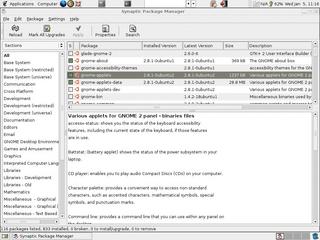
Ubuntu assigns software on its servers to four categories, or repositories. main contains free software for which Canonical offers technical support. Support is also available for the packages in the restricted repository. This area contains packages with a non-free licensing policy - although downloads are free of charge - including the drivers for NVidia and ATI graphics adapters.
With a few exceptions, the universe repository has the same selection of packages as Debian, adding packages such as the Prism2 WLAN drivers. However, this repository is not officially supported, and there is no guarantee of timely security updates. Ubuntu applies the same conditions to the multiverse repository, which contains commercial software. This includes tools such as the partly patented lame library for creating MP3 files or codecs for viewing proprietary multimedia formats.
The configuration file for universe, /etc/apt/sources.list, has a useful set of entries you can configure following the Ubuntu install. As the entries are commented out by default, you need to run an editor to remove the comment characters, or enable the entries in the Synaptic package manager (Figure 3) via the System Configuration | Packet Sources menu.
Thus far, support is available only from Canonical, the company behind the Ubuntu project. There are two service levels referred to as "Standard" and "Premium." These variants differ with respect to the number of incidents covered and the guaranteed response time. "Premium" support costs US$ 700 per server installation and year, or US$ 250 per desktop and year. The price for "Standard" support is US$ 400 per server installation and year, or US$ 100 per desktop and year. If you prefer not to sign a support agreement, incident support is available at US$ 30 per incident.
As an alternative to commercial support, there are a number of Internet pages with free support. The Ubuntu homepage has an overview that points you to well-attended and active discussion forums and a Wiki. There are also various links to more help pages, such as the useful list of Ubuntu HOWTOs [4]. The Ubuntu user community is another useful resource [5].
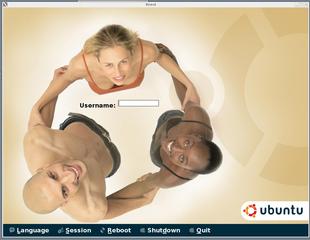
Users who are unfamiliar with Debian will soon find themselves in need of help if they want to proceed beyond the minimal requirements of a desktop user. If you are unfamiliar with the efficient but non-intuitive way that Debian handles system configuration, you might find yourself floundering with Ubuntu. There are a few useful Gnome tools that help you set up network cards or manage packages, but expect your mileage to vary as a newcomer without expert help.
Trouble starts with the default package selection. This gives you a complete desktop, but there is a lack of detail in parts. For example, users with non-English set ups will typically need to install localized packages for the default Firefox web browser or the OpenOffice suite. On the upside, a lot of progress has been made towards localizing the rest of the Gnome desktop; there are just one or two programs and help files missing.
The sparse selection of software leads to other issues. For example, the default install does not give you an SSH server or client. Desktops do not typically run 24 x 7. And whereas Debian uses the anacron package to ensure that cronjobs run regularly, Ubuntu fails to install this tool, leaving users to download it from the universe repository.
Ubuntu comes with a lot of artwork that really peps up the Gnome desktop, and it has a really neat theme of its own. Ubuntu also gives you a selection of login images (Figure 4). ubuntu-calendar is a Ubuntu-specific metapckage that changes the desktop background once a month. If you enable ubuntu-calendar in your desktop preferences, you can look forward to new wallpaper at regular intervals, assuming that you update once in a while.
Despite Debian's advantages, professional users are increasingly put off by its disadvantages. Faced with a choice between ancient software or software without timely security updates, many users simply migrate to another distribution. Ubuntu's answer to this dilemma is a state-of-the-art system backed by a community - with the option of professional support for those who need it. Add a regular release cycle and timely updates to the well known advantages of Debian - sophisticated package management, stability, and a consistent configuration - and you'll find strong arguments in favor of Ubuntu.
The main repository is so spartan that most users will be forced to resort to the universe repository sooner or later. This means losing some of the advantage over using Debian Sarge in the testing phase. Canonical will need to move a few packages from universe to the main repository to give users a complete desktop system. This said, Ubuntu is a great alternative for fans of Debian who need a convenient way of adding proprietary packages to their systems. And the latest Gnome desktop, accompanied with excellent artwork, puts Ubuntu in a class of its own.
| INFO |
|
[1] Debian: http://www.debian.org [2] Canonical: http://www.canonical.com [3] Ubuntu Linux: http://www.ubuntulinux.org [4] Ubuntu how-tos: http://www.ubuntulinux.org/support/documentation/howto/howtofolder_view [5] Ubuntu user community: http://www.ubuntulinux.org/community/ |